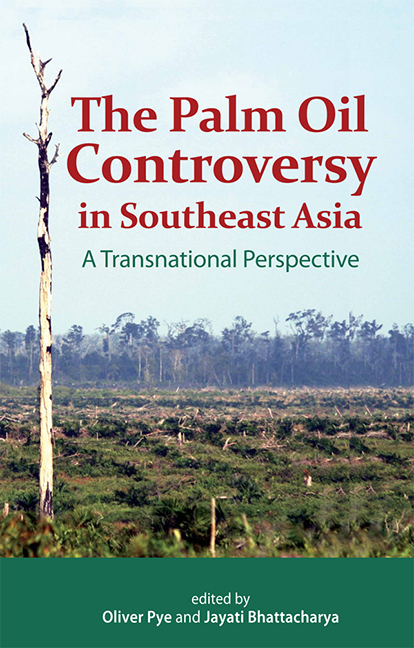Book contents
- Frontmatter
- Contents
- Foreword
- Preface
- Contributors
- Abbreviations
- 1 Introduction
- 2 Malaysian Corporations as Strategic Players in Southeast Asia's Palm Oil Industry
- 3 The Political Ecology of the Indonesian Palm Oil Industry
- 4 Evolutionary Change in the Oil Palm Plantation Sector in Riau province, Sumatra
- 5 Contradictions of Palm Oil Promotion in the Philippines
- 6 The Political Economy of Migration and Flexible Labour Regimes: The Case of the Oil Palm Industry in Malaysia
- 7 Migration and Moral Panic: The Case of Oil Palm in Sabah, East Malaysia
- 8 Reconciling Development, Conservation, and Social Justice in West Kalimantan
- 9 An Analysis of Transnational Environmental Campaigning around Palm Oil
- 10 EU Biofuel Policies and their Implications for Southeast Asia
- 11 Leveraging Product and Capital Flows to Promote Sustainability in the Palm Oil Industry
- 12 Free, Prior, and Informed Consent? Indigenous Peoples and the Palm Oil Boom in Indonesia
- Index
- Plate section
Foreword
Published online by Cambridge University Press: 21 October 2015
- Frontmatter
- Contents
- Foreword
- Preface
- Contributors
- Abbreviations
- 1 Introduction
- 2 Malaysian Corporations as Strategic Players in Southeast Asia's Palm Oil Industry
- 3 The Political Ecology of the Indonesian Palm Oil Industry
- 4 Evolutionary Change in the Oil Palm Plantation Sector in Riau province, Sumatra
- 5 Contradictions of Palm Oil Promotion in the Philippines
- 6 The Political Economy of Migration and Flexible Labour Regimes: The Case of the Oil Palm Industry in Malaysia
- 7 Migration and Moral Panic: The Case of Oil Palm in Sabah, East Malaysia
- 8 Reconciling Development, Conservation, and Social Justice in West Kalimantan
- 9 An Analysis of Transnational Environmental Campaigning around Palm Oil
- 10 EU Biofuel Policies and their Implications for Southeast Asia
- 11 Leveraging Product and Capital Flows to Promote Sustainability in the Palm Oil Industry
- 12 Free, Prior, and Informed Consent? Indigenous Peoples and the Palm Oil Boom in Indonesia
- Index
- Plate section
Summary
This collection of papers on the “palm oil controversy” focuses on one crop and on one specific region, but the issues discussed in this book relate to a global controversy that has come to be known — and to be criticized — as land grabbing. In the initial surge of reports and studies on contemporary land grabbing there is a dominant assumption that the phenomenon has occurred because of the 2007–8 food crisis, which in turn was largely caused by the emerging global biofuels complex (White and Dasgupta 2010; Franco et al. 2010).1 The changes in the global agro-food system made some financially powerful countries (primarily China, South Korea, the Gulf States) that could not produce sufficient food domestically feel insecure. They started to seek control over large tracts of land overseas to secure food supply. The principal target is Africa, where vast empty lands are thought to be available, cheaply. It is generally assumed that 70 per cent of all land that was grabbed is in Africa. (Inter)national public policymaking aimed at addressing some of the serious concerns in the current land rush (expulsion of peasants from their land, corrupt land deals, and so on) has been under way and is politically contested.
These assumptions have been increasingly challenged. Visser and Spoor (2011) identify the former Soviet Eurasia, and Borras and Franco (2011) Southeast Asia as important regional sites of land grabs too. Levien (2011) raises the issue of domestic land grabs, Amanor (2012) on the role of transnational corporations and global commodity chains, Hall (2011) on pre-existing crop boom-bust cycles, McMichael (2012) on the location of land grabs in the restructuring of the global food regime, Mehta, Veldwisch and Franco (2012) on the water dimension of land grabbing, Hofman and Ho (2012) on a better view of Chinese land grabbers, Li (2011) on centring labour in the debate, De Schutter on the right to food dimension, and Fairhead, Leach and Scoones (2012) on “green grabbing” — land grabbing in the name of the environment. Peluso and Lund (2011) offer fresh analytical insights on new frontiers of land control more generally, while Cotula (2012) offers a useful comprehensive overview on key issues in current land grabs.
- Type
- Chapter
- Information
- The Palm Oil Controversy in Southeast AsiaA Transnational Perspective, pp. vii - xiiPublisher: ISEAS–Yusof Ishak InstitutePrint publication year: 2012



